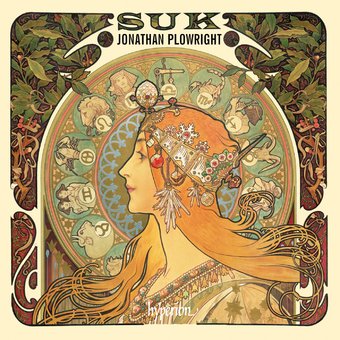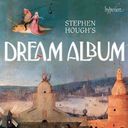Jonathan Plowright Suk:Piano Music

| Price: | $18 |
| List Price: |
|
| You Save: | $1.98 (10% Off) |
|
Brand New
|
CD Details
- Released: June 29, 2018
- Originally Released: 2018
- Label: Hyperion
Tracks:
- 1.Jonathan PlowrightSpring, Op. 22a: I. Spring. Allegro con brio
- 2.Jonathan PlowrightSpring, Op. 22a: II. The Breeze. Andante, quasi allegretto
- 3.Jonathan PlowrightSpring, Op. 22a: III. Awaiting. Andante con moto ed espressivo
- 4.Jonathan PlowrightSpring, Op. 22a: IV. ***. Andante
- 5.Jonathan PlowrightSpring, Op. 22a: V. Longing. Allegro non troppo
- 6.Jonathan PlowrightSummer Impressions, Op. 22b: I. At Noon. Moderato
- 7.Jonathan PlowrightSummer Impressions, Op. 22b: II. Children at Play. Allegretto
- 8.Jonathan PlowrightSummer Impressions, Op. 22b: III. Evening Mood. Andante espressivo
- 9.Jonathan PlowrightPiano Pieces, Op. 7: I. Song of Love. Allegro non troppo lento
- 10.Jonathan PlowrightPiano Pieces, Op. 7: II. Humoresque. Allegretto grazioso
- 11.Jonathan PlowrightPiano Pieces, Op. 7: III. Recollections. Andante con moto quasi improvisando
- 12.Jonathan PlowrightPiano Pieces, Op. 7: IV. Idyll No. 1. Moderato
- 13.Jonathan PlowrightPiano Pieces, Op. 7: IV. Idyll No. 2. Tempo comodo
- 14.Jonathan PlowrightPiano Pieces, Op. 7: V. Dumka. Andante
- 15.Jonathan PlowrightPiano Pieces, Op. 7: VI. Capriccietto. Allegro assai
- 16.Jonathan PlowrightMoods, Op. 10: I. Legend. Andante espressivo
- 17.Jonathan PlowrightMoods, Op. 10: II. Capriccio. Allegro ma non troppo
- 18.Jonathan PlowrightMoods, Op. 10: III. Romance. Andante con moto
- 19.Jonathan PlowrightMoods, Op. 10: IV. Bagatelle. Moderato
- 20.Jonathan PlowrightMoods, Op. 10: V. Spring Idyll. Vivace
Product Description:
In common with many Czech composers of the eighteenth and nineteenth centuries, Suks origins were in a musical family from the Bohemian countryside rather than Prague. Tutored in his early years by his father, also Josef Suk, the school- and choirmaster of the small village of Krecovice, Josef junior soon moved on to the capital and from 1885 studied at the Prague Conservatory. He made remarkable strides in both composition and performance, staying on for a final year of study with Dvorák (who had joined the staff of the Conservatory in 1891) and graduating with an orchestral work, the Dramatic Overture, in 1892. Alongside his compositional activities, Suk specialized in chamber music with Hanu Wihan, the leading Czech cellist of the day and the dedicatee in 1895 of Dvoráks B minor cello concerto. This association led to Suk becoming the second violin of the Czech String Quartet in 1892, an appointment that initiated a busy, often international career as a performer that continued until his retirement over forty years later.
Suks links with the Dvorák family developed strongly through the 1890s and in 1898 he married the composers daughter Otilie (Otilka). Dvorák was an enthusiastic supporter of his career throughout this time; the sincerity of his interest can be gauged by a comment made to the composer and viola player of the Czech String Quartet, Oskar Nedbal, in which he described Suks incidental music to Julius Zeyers fairy-tale play Radúz and Mahulena as music from heaven. In fact, his music for Radúz and Mahulena, with its intense and abundant lyricism, was an expression of his profound love for Otilka. Her premature death in 1905, hardly more than a year after that of her father, was a devastating blow prompting a deepening of Suks style and a greater monumentality in his approach to form as can be heard in the Asrael symphony and later orchestral works.
Given the similarity of their backgrounds and obvious personal affinity, it can be tempting to over-emphasize common stylistic traits in Suk and Dvoráks music. But in fact their musical languages were quite different; one of the great qualities of Dvoráks teaching was that he saw to it that his pupils were no mere imitators. Even in Suks early works there is considerable individuality in both melodic writing and his approach to structure. There is also a strong tendency toward expressive melancholy well before the dual tragedies of the deaths of Dvorák and Otilka.
The four groups of pieces for piano on this recording come from the first half of the 1890s (Opp 7 and 10) and 1902 (Opp 22a and 22b). Along with his professional engagement with the violin, Suk was an accomplished pianist, and from an early stage wrote with idiomatic confidence for the instrument in a series of works that often require considerable virtuosity. In inspiration, most of his piano music can be located firmly within the traditions of the romantic character piece. Along with such conventional designations as Capriccio and Romance found in the earlier sets of Opp 7 and 10, Suk also adopted the picturesque titles favoured by Schumann and also found in many of the solo piano collections of Smetana, Dvorák and Janácek.
Suks Op 7 collection of piano pieces is a gathering of individual works composed between 1891 and 1893, and first published as a whole in 1894. The first in order of composition is the concluding Capriccietto (originally entitled Melody); it begins with determination, but concludes on a reflective note. The next two to be written were the two Idylls. Originally entitled Waltzes, they were first published in 1893 as Winter idylls (Zimní idylky), dedicated to Nasta Hakovcová, a friend of Suks sister Emilie, in an anthology of Slavic piano music assembled by the composer Zdenek Fibich. Unquestionably waltz-like in rhythm, the first has a wistful quality sustained into the second where, after a more impassioned central section, the piano figuration seems to be evoking the sound of the cimbalom. From 1893, the Song of love (Písen lásky), originally entitled Romance, was the last to be composed and is the longest of the set. After a languorous beginning, it develops passionately before a return to the sultry mood of the opening. The Humoresque is a brief, excitable waltz (its original title); it is followed by Recollections (Vzpomínky) whose opening may owe something to the start of the second movement of Dvoráks Dumky trio. After the Idylls, the first of the two remaining movements, Dumka, begins with the measured tread of a funeral march, but this is leavened by a delightfully open-hearted central section before the opening returns with even greater seriousness. Suks understanding of the Dumka manner is very close to that of his father-in-law Dvorák: essentially, it involved the alternation of slow, thoughtful music with episodes of a more optimistic nature.
The group of five Moods (Nálady) which concludes this recording were composed between 1894 and 1895 and published by the Berlin publisher Simrock in 1896; they were dedicated to the Viennese pianist Clothilde Kleeberg who often played with the Czech Quartet. The opening Legend is expansive with a strong sense of epic narrative incorporating moments of almost Lisztian rhetoric. The Capriccio which follows is a poised and whimsical movement in Polka rhythm. The brief Romance at the heart of the set is characterized by surging melody often underpinned by exploratory harmonies. An understated Bagatelle leads to a racy, good-humoured finale entitled Spring idyll (Jarní idyla). As a whole this set impresses by its balance of both form and technique, not to mention the considerable demands it places on the performer.
The two cycles Spring (Jaro) and Summer impressions (Letní dojmy) were composed in 1902. Seven years on from the Moods, they were from a very different time in Suks life when early aspiration had given way to the contentment of marital bliss. Married to Otilka for four years, he had just experienced acute joy at the birth of their sonanother Josefan event that cemented his feelings of contentment and security. Nearly two decades later, he wrote to the musicologist Otakar ourek about these years in which he produced music of joy, full of love. The reason both cycles share the same opus number (22a and b) derives from Suks original intention, made clear in a letter to his publisher, to produce four collections based on the seasons; unfortunately, he did not get around to composing Autumn and Winter.


























